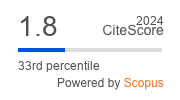The Sentiment Analysis of Spider-Man: No Way Home Film Based on IMDb Reviews
Abstract
Sentiment analysis is used to determine the overall sentiment in a movie review. The goal of this paper is to investigate the sentiment analysis using multiple classification methods from Spider-Man: No Way Home movie reviews. The review dataset is procured from the IMDb website. Preprocessing methods are used and compared to determine the difference in accuracy score. The methods proposed for this study include Naïve-Bayes, Support Vector Machine (SVM), Stochastic Gradient Descent (SGD), and Decision Tree to find the best accuracy possible. The sentiment analysis of the movie review resulted in 94 positive reviews and 65 negative reviews. The highest accuracy and f1 score for this study are obtained from the SVM and the SGD classifier with an accuracy of 82% and an F1 score of 81% respectively
Downloads
References
R. Bintang Purnomoputra and U. Novia Wisesty, “Sentiment Analysis of Movie Reviews using Naïve Bayes Method with Gini Index Feature Selection,” OPEN ACCESS J DATA SCI APPL, vol. 2, no. 2, pp. 85–094, 2019, doi: 10.34818/JDSA.2019.2.36.
M. B. Hamzah, “Classification of Movie Review Sentiment Analysis Using Chi-Square and Multinomial Naïve Bayes with Adaptive Boosting,” Journal of Advances in Information Systems and Technology, vol. 3, no. 1, 2021, [Online]. Available: https://journal.unnes.ac.id/sju/index.php/jaist
M. A. Muslim, “9. Improve the Accuracy of Support Vector Machine Using Chi Square Statistic and Term Frequency Inverse Document Frequency on Movie Review Sentiment Analysis.”
R. Maulana, P. A. Rahayuningsih, W. Irmayani, D. Saputra, and W. E. Jayanti, “Improved Accuracy of Sentiment Analysis Movie Review Using Support Vector Machine Based Information Gain,” in Journal of Physics: Conference Series, Nov. 2020, vol. 1641, no. 1. doi: 10.1088/1742-6596/1641/1/012060.
Y. Nurdiansyah, S. Bukhori, and R. Hidayat, “Sentiment analysis system for movie review in Bahasa Indonesia using naive bayes classifier method,” in Journal of Physics: Conference Series, Apr. 2018, vol. 1008, no. 1. doi: 10.1088/1742-6596/1008/1/012011.
T. Hariguna, W. Maulana Baihaqi, and A. Nurwanti, “Sentiment Analysis of Product Reviews as A Customer Recommendation Using the Naive Bayes Classifier Algorithm,” International Journal of Informatics and Information Systems, vol. 2, no. 2, pp. 48–55, 2019.
E. Tyagi and A. K. Sharma, “Sentiment Analysis of Product Reviews using Support Vector Machine Learning Algorithm,” Indian Journal of Science and Technology, vol. 10, no. 35, pp. 1–9, Jun. 2017, doi: 10.17485/ijst/2017/v10i35/118965.
S. Dey, S. Wasif, D. S. Tonmoy, S. Sultana, J. Sarkar, and M. Dey, “A Comparative Study of Support Vector Machine and Naive Bayes Classifier for Sentiment Analysis on Amazon Product Reviews,” in 2020 International Conference on Contemporary Computing and Applications, IC3A 2020, Feb. 2020, pp. 217–220. doi: 10.1109/IC3A48958.2020.233300.
M. Guia, R. R. Silva, and J. Bernardino, “Comparison of Naive Bayes, support vector machine, decision trees and random forest on sentiment analysis,” in IC3K 2019 - Proceedings of the 11th International Joint Conference on Knowledge Discovery, Knowledge Engineering and Knowledge Management, 2019, vol. 1, pp. 525–531. doi: 10.5220/0008364105250531.
V. A. Fitri, R. Andreswari, and M. A. Hasibuan, “Sentiment analysis of social media Twitter with case of Anti-LGBT campaign in Indonesia using Naïve Bayes, decision tree, and random forest algorithm,” in Procedia Computer Science, 2019, vol. 161, pp. 765–772. doi: 10.1016/j.procs.2019.11.181.
Nurfaizah, T. Hariguna, and Y. I. Romadon, “The accuracy comparison of vector support machine and decision tree methods in sentiment analysis,” in Journal of Physics: Conference Series, Nov. 2019, vol. 1367, no. 1. doi: 10.1088/1742-6596/1367/1/012025.
A. Bayhaqy, S. Sfenrianto, K. Nainggolan, and E. R. Kaburuan, “Sentiment Analysis about E-Commerce from Tweets Using Decision Tree, K-Nearest Neighbor, and Naïve Bayes,” Jul. 2018. doi: 10.1109/ICOT.2018.8705796.
V. Dwi Antonio, S. Efendi, and H. Mawengkang, “Sentiment analysis for covid-19 in Indonesia on Twitter with TF-IDF featured extraction and stochastic gradient descent,” Int. J. Nonlinear Anal. Appl, vol. 13, no. 1, pp. 2008–6822, 2022, doi: 10.22075/ijnaa.2021.5735.
N. Khotimah, M. Yamin Darsyah, and I. M. Nur, “Analisis Sentimen Terhadap Review E-Commerce Dengan Metode Stochastic Gradient Descent.” [Online]. Available: http://repository.unimus.ac.id
Shadi. Diab, “Optimizing stochastic gradient descent in text classification based on fine-tuning hyper-parameters approach. a case study on automatic classification of global terrorist attacks.” Accessed: Jan. 25, 2022. [Online]. Available: arXiv preprint arXiv:1902.06542 (2019).---
Copyright (c) 2022 Jurnal RESTI (Rekayasa Sistem dan Teknologi Informasi)

This work is licensed under a Creative Commons Attribution 4.0 International License.
Copyright in each article belongs to the author
- The author acknowledges that the RESTI Journal (System Engineering and Information Technology) is the first publisher to publish with a license Creative Commons Attribution 4.0 International License.
- Authors can enter writing separately, arrange the non-exclusive distribution of manuscripts that have been published in this journal into other versions (eg sent to the author's institutional repository, publication in a book, etc.), by acknowledging that the manuscript has been published for the first time in the RESTI (Rekayasa Sistem dan Teknologi Informasi) journal ;








